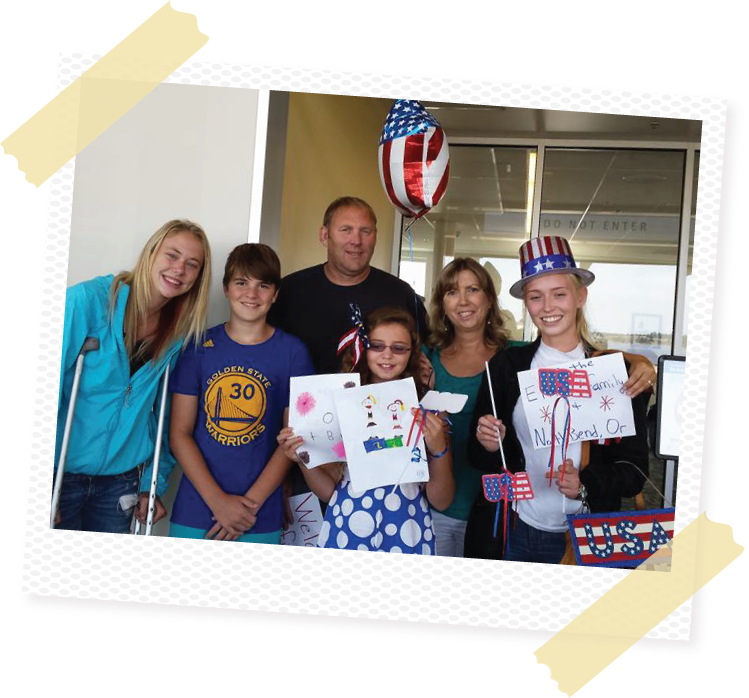 Several years ago a friend of mine decided to become a host mom to two exchange students. As a single woman she'd never had any children, so her friends decided to throw a "baby shower" for her. They had a party and gave her gifts of teen decor for the bedroom. Just like any expectant mom, she asked for advice on how to parent her new teens.
Several years ago a friend of mine decided to become a host mom to two exchange students. As a single woman she'd never had any children, so her friends decided to throw a "baby shower" for her. They had a party and gave her gifts of teen decor for the bedroom. Just like any expectant mom, she asked for advice on how to parent her new teens.
Welcoming an exchange student is welcoming a new member of the family into your home, and a bit of guidance can go a long way. Unlike welcoming a new baby, this new family member comes to you with preconceived notions of what an American family is like. Often these ideas are based on things learned from the movies, television shows and from other people’s experiences. Your student will also arrive with their own experiences, customs and habits from their home, family and culture. Knowing this ahead of time can help avoid some common mistakes and get right into having an amazing time.
Tip #1: Define Your Expectations
 Once the novelty wears off, host parents often come to a point where they wonder “Why did we do this?”. An amazing experience is ahead, but there will also be a few bumps in the road. This is, after all, a teenager you’re living with. Teens need guidance. Teens need rules and boundaries. In the back of the ICES Participant Handbook is a form called Home Sweet Home. This form is designed to help you clearly teach your exchange student the rules, routines, and expectations of your family. We have found that families who use this have more successful communication and an easier transition. Sitting down as a family to discuss and put into writing your expectations, routines, and traditions is vital to your success as a host family. As you do this, your student may nod their head and smile at you, not really understanding at first. But as you journey through the year, the things that you wrote down will begin to make sense. If you haven’t done it yet, it isn’t too late. You can download the handout here.
Once the novelty wears off, host parents often come to a point where they wonder “Why did we do this?”. An amazing experience is ahead, but there will also be a few bumps in the road. This is, after all, a teenager you’re living with. Teens need guidance. Teens need rules and boundaries. In the back of the ICES Participant Handbook is a form called Home Sweet Home. This form is designed to help you clearly teach your exchange student the rules, routines, and expectations of your family. We have found that families who use this have more successful communication and an easier transition. Sitting down as a family to discuss and put into writing your expectations, routines, and traditions is vital to your success as a host family. As you do this, your student may nod their head and smile at you, not really understanding at first. But as you journey through the year, the things that you wrote down will begin to make sense. If you haven’t done it yet, it isn’t too late. You can download the handout here.
Tip #2: Don't Misjudge Cultural Differences as Bad Behavior
 I often hear things like “she is a diva” or “he just wants to argue with me” when I speak with host parents about an issue they are having with their exchange student. Then, when I speak with the student, I find that they are confused. They don’t know what they’ve done wrong and they just want to hide in their room because they feel they aren’t liked anymore.
I often hear things like “she is a diva” or “he just wants to argue with me” when I speak with host parents about an issue they are having with their exchange student. Then, when I speak with the student, I find that they are confused. They don’t know what they’ve done wrong and they just want to hide in their room because they feel they aren’t liked anymore.
Generally speaking, American parents expect and have taught their own children from the time they were toddlers to pick up after themselves, to say the "magic words” and to not talk back. This is an American thing. In many other cultures, parents view these behaviors differently.
In many countries, parents do things for their children--such as cleaning, doing their laundry, and making them snacks--as a way of showing love and affection. So our exchange students can be genuinely surprised and somewhat hurt when the host mother teaches them to do their own laundry, keep their bathroom clean, or doesn’t fix them a snack after school. Putting these actions through their cultural filter, they interpret them to mean that the host mom doesn’t care about them.
 Virtually all exchange students find it strange and somewhat comical that Americans say please and thank you so often, and in such trival matters. Elsewhere, these phrases are reserved for more significant acts, and the frequent use here sometimes makes students feel there is less sincerety in the words.
Virtually all exchange students find it strange and somewhat comical that Americans say please and thank you so often, and in such trival matters. Elsewhere, these phrases are reserved for more significant acts, and the frequent use here sometimes makes students feel there is less sincerety in the words.
In many cultures debates are considered a healthy form of communication. Children are taught--both at home and in school--to clearly state and support their perspective. Teachers grade students on their participation in class debates. Students and parents debate until one convinces the other of the validity of their point. Here in the U.S., parent/child debates are considered rude and disrespectful, and parents rarely change their minds, but instead often punish their exchange student for “arguing”. These challenges are culture clashes, the coming together of different cultures where things are viewed and understood differently.
Your exchange student came to learn a new culture, views, perspectives, and values. But don't expect your student to automatically know what is acceptable here. When you see behaviors and attitudes that clash with our way of life, use it as a springboard for discussing cultural differences. Then teach the student what is appropriate here. As you help your exchange student learn a new way of interacting, both you and the student will learn to see and appreciate the differences, and this will enhance your experience.
Tip #3: Remember You’re Not Alone
.jpg?width=345&name=Peggie%20(2).jpg) Something often forgotten by first-time host parents is that you have a large support system ready, willing and able to help you navigate this experience. Your Local Coordinator is nearby and full of experience and tips to share with you. Staying in close contact with your Local Coordinator, keeping them up-to-date with the good and the not-so-good will allow them to support your efforts and keep small issues from escalating. Behind the Local Coordinator is a Regional Director who has a vast amount of experience and ideas to offer. Finally, there is the ICES Student Services department which is staffed with full-time counselors to provide support during the toughest situations.
Something often forgotten by first-time host parents is that you have a large support system ready, willing and able to help you navigate this experience. Your Local Coordinator is nearby and full of experience and tips to share with you. Staying in close contact with your Local Coordinator, keeping them up-to-date with the good and the not-so-good will allow them to support your efforts and keep small issues from escalating. Behind the Local Coordinator is a Regional Director who has a vast amount of experience and ideas to offer. Finally, there is the ICES Student Services department which is staffed with full-time counselors to provide support during the toughest situations.
Being a host family is a rewarding, life-changing experience. Remember to enjoy the moments along the way, and seeing each experience, whether pleasant or frustrating, as a learning opportunity will result in the amazing exchange year you hoped for.
.jpg?width=513&name=empty%20nest5%20(2).jpg)

.jpg)

